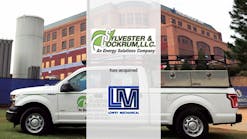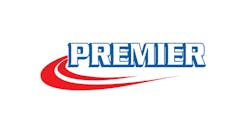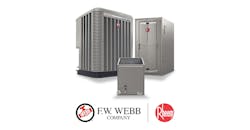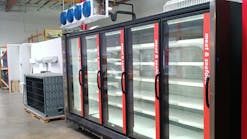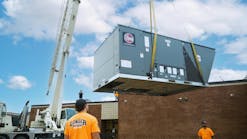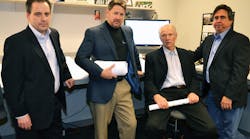2016 Commercial HVAC Contractor of the Year: Capital Ideas for the D.C. Region
The Bowers Group is one of the nation’s largest and most respected mechanical contractors. Since its founding by Wayne E. Bowers in 1984, The Bowers Group has continued to provide superior mechanical construction and HVAC services to general contractors, high-tech companies, property managers, government agencies and institutional clients throughout the District of Columbia, Maryland and Virginia.
When you read the list of specialties handled by this team of 680 employees, its clear to see they are serious players, who know what’s required to remain at the top, completing complex mechanical projects in one of the nation’s most high-profile and competitive construction regions.
From basic air conditioning, heating and plumbing, the company’s expertise has expanded over the years into building operations, energy savings solutions, commissioning/retro-commissioning, data centers, chiller replacement and repair, and boiler service and replacement.
From basic air conditioning, heating and plumbing, the company’s expertise has expanded over the years into building operations, energy savings solutions, commissioning/retro-commissioning, data centers, chiller replacement and repair, and boiler service and replacement.
In the service realm, The Bowers Group’s service department is staffed by factory-trained technicians who support and assist the construction department--as well as its own 400 service clients — in the installation, start-up, and maintenance of all aspects of heating, ventilation and air conditioning.
Wayne E. Bowers started the W.E. Bowers Company in 1984, after working for 18 years with three contracting companies. From the first days, when he was using a door as a drawing table in a home office, he’s watched the company grow from himself as the sole employee, to the current roster of hundreds.
Like many who have struck out on their own after working elsewhere, steamfitter Wayne Bowers’s past experiences helped him envision the type of company he wanted to start.
You have to understand that you must treat people as well as you possibly can. That goes for employees, subcontractors, general contractors, vendors and clients. — Wayne Bowers.
“The first company I worked for was great, but it was eventually sold to a publicly owned company, and I left. The second two were poorly run and poorly managed. That’s when I told myself I could do a much better job if I had a business of my own. Eventually, I decided to give it a try.”
As a new entrepreneur, Bowers filled his time on small projects. Then, one day he received a call from a past client, who needed mechanical systems installed in a hotel. That project set him on the success track. He billed $1 million in work in his first year, and $2 million in the second. In two years, he had five employees.
The reason he’s been successful? “Obviously you have to have a fair price and a great product,” Bowers answers. “But you also have to understand that you must treat people as well as you possibly can. That goes for employees, subcontractors, general contractors, vendors and clients.”
Wayne Bowers also had a definite opinion on how to treat co-workers and employees.
“The last guy I worked for, at a small general contractor didn’t treat people very well. And our field guys were good guys, because I’d hand picked them. Sometimes they’d stop by the office and he always treated them like they had the plague.”
“I told him, those guys work hard if they feel like they’re respected. Treat them well and they will continue to do good work. So, that’s one thing we’ve always done. You have to treat employees well. Especially to grow the service business. Ken and Dave know they have to take care of the good guys. They love that pat on the back.”
All-Pro Management Team
Kenneth “Kenny” Colburn is The Bowers Group’s special project manager, who also oversees construction and management of critical facilities, a top-quality pre-fabrication facility, sales and marketing, and the emergency service and maintenance department. His background before joining in 1986 included working for Johnson Controls and one other mechanical firm.
Executive vice president of mechanical construction David J. O’Donnell is responsible for daily department operations, project management, estimating, purchasing, project negotiations and pre-construction. He oversees fast-track project management and budgeting, while coordinating trades and field personnel. His experience includes new construction, tenant build-out, and renovation for commercial, healthcare, laboratory, and entertainment projects.
As chief financial officer, Richard Harrington brings thirty-plus years of construction-related, financial experience. In his role, Harrington will assume responsibility for all banking and insurance relationships as well as accounting department oversight. In addition, he will offer senior staff guidance as well as operational status updates to shareholders and associated third-party members.
With more than 40 years of experience in HVAC and Plumbing, Jay H. Schwab currently serves as vice president of the construction department. His responsibilities include prime contract management and project management supervision for hospital, institutional, commercial and entertainment projects in new construction, renovation and Design/Build.
Vice President Thomas D. Palmer joined W.E. Bowers in 1986, and has more than 25 years of experience in the mechanical service industry — including project management, cost estimating and budgeting, field supervision, and troubleshooting. He designs, estimates, and installs systems for special needs areas — such as computer rooms, conference and training areas, and call centers.
Employees Got Them There
The company’s reputation as one that respects employees has helped it find and retain some of the best mechanical systems specialists in the region. Many of those employees have said they appreciate the respect and low-pressure atmosphere that typifies each department.
“This is not a pressure cooker. It’s a laid-back atmosphere here; we’re an easy going, friendly company,” says Colburn. We’ve always been self motivated, and there’s nobody screaming at you.”
“We’re also very flexible,” O’Donnell adds. “Nobody punches a clock here. Our project managers and staff know what their responsibilities are. They know that the owners don’t want a phone call from the client because somebody is not doing his job. Everybody has the same mentality. It is the construction business. It can be fun, never boring, and sometimes the last place you want to be. But most, if not all of our employees enjoy walking in the front door.”
The Bowers Group shuns micro-management, which ultimately results in happier employees and improved productivity.
“We’re too busy to micro-manage,” Colburn laughs. “If something goes right instead of left, we learn from it and go on from there. Everyone knows their function, their job, and the process we follow.”
Indeed, take a tour of any of the Group’s main production areas, and you will see the process in action. Every welder, every steamfitter, every helper, is in “excellence” mode, and knows his task and the tasks of others.
Some Sheet Metal Fabrication
In December, 2015 The Bowers Group began an ever-so-gradual expansion into sheet metal fabrication, though only for special projects and service needs.
“I’m always looking for new ways to get work, and new things to help us improve,” Colburn says, whether its in new tools or new markets. This is why we’ve moved into sheet metal fabrication. We bought the equipment in place and running from a company that closed it doors. We hired most of their guys, and made it into a very affordable turnkey operation.
“It will be a slow process. We’re not looking to be a full sheet metal contractor,” Colburn says. “We still rely on sheet metal subcontractors.”
Pre-Fab Excellence
Pre-fabrication — in which mechanical sections are assembled at the shop and transported to a job site — has become standard operating procedure for the nation’s greatest mechanical contracting firms.
The Bowers Group’s diverse client base helps provide job security; when one sector is down, another can be on the upswing. And, its stellar reputation doubles as its most attractive marketing magnet.
The Bowers Group production facilities include a 45,000 sq. ft. steel shop; a copper/prefab shop of 40,000 sq.ft. and a 36,000 sq. ft. sheet metal shop in Alexandria, that will soon be moved to a site closer to the main office.
Pre-fabrication has transformed the mechanical contracting industry, and The Bowers Group has what is one of the best pre-fab shops in the business.
Its pre-fabrication facility was established 10 years ago, and is now one of the largest in the Washington, D.C. metro area. Having a pre-fab facility allows the teams to produce a high quantity of coordinated mechanical systems in a closely-monitored, quality-controlled environment. It’s fascinating to observe pre-fab in action.
“Being as efficient as we are with fabrication makes us more competitive, and has helped us through the recession and the leaner times,” Colburn says. “We have the horsepower, the revenue, and the skill to take jobs cheaper that other companies aren’t as strong as we are can’t take. We can take it cheaper and figure out how to make money on it. I save money on tools and materials, and it’s a safer way to work. It also forces you to build leaner. Pipe is delivered to the job and goes directly onto the hangers.
“Walking through the fab shop, I showed you the process. We track enough that’s useful for us but we don’t overdo it. We keep it as simple as we can. Trimble, building information modeling, and pre-fab systems have taken us so much farther.”
Workflow, Talent Analyzed for Best Response
Smart service management includes being able to carefully match the skills of a service department team, who all have extensive field experience, with the needs of the client. Bowers schedules its workflow so that there is always at least one service department professional in the office at all times. This also allows the field technicians the advantage of a readily-available second opinion on difficult repairs.
Preventive maintenance programs for the firm’s 400 PM contracts meet a variety of client requirements, from basic coverage to computerized tracking of each piece of equipment. Individual tracking allows the client to evaluate the cost efficiency and reliability of critical area equipment. In addition, Bowers provides remote environmental monitoring, which allows it to spot troubled HVAC equipment from the office before costly system failures occur. They usually will have dispatched a technician before the client has noticed the problem. Their service department is entirely paperless, and works entirely off tablets. Technicians take trucks home, and each day dial in to the dispatch board before and after calls. Billing is completed within two weeks. Time sheets are updated as the week goes on.
Business Plans Become Outdated
The Bowers Group has been on such a fast growth track that business plans have become unnecessary in plotting its future success.
“Each year, we would try growth management and business planning, but we just blew it out of the water every year,” Colburn explains. “Now, I keep track of milestones in the monthly financials. We barely do forecasting anymore, because I can keep track of where we’re at without it. We have good financial procedures that help us keep an eye on the numbers, and see when trends are turning, and other indicators.”
“People ask me all the time, ‘What’s the master plan?’” O’Donnell says. “The plan is to make a good living, and to go home without feeling you’ve been beat up. We’ve never said, ‘We’re going to do X dollars this year.’ We grew up in a really good time with some of our best clients. And, year after year, we continue to grow, to a point where we’ve saturated the market so much that there’s not a whole lot more that we want to work for.”
The Bowers Group’s diverse client base helps provide job security; when one sector is down, another can be on the upswing. And, its stellar reputation doubles as its most attractive marketing magnet.
“We don’t have one marketing department, we have many: our various divisions,” Colburn says. “We’re all salesmen, and we have our reputation. The general contractors, developers and data center world know who we are and what we can do.”
Data Center Specialists
W.E. Bowers prides itself on being a national leader when it comes to understanding and building complex, unique, secure and customer proprietary critical facilities. They’ve completed many critical data centers for the government, Fortune 500 and co-location companies, and are right now in the middle of a handful of high-level projects for major corporate clients.
“Building data centers probably generates the majority of our revenue. We’re very good at it,” Colburn states. “As far as I’m concerned we’re the best around. I’m sure we’ve built and maintain more regional data centers than anybody else.”
Colburn says the key to success in data center is on schedule delivery.
“Data centers are 100 percent schedule-driven. And, you must understand that there will be changes in mid-project. Data center managers are on the cutting edge of technology, and are always discovering new methods, such as raising ambient temperatures or installing customized systems and increased energy efficiency. It always changes from the base design. You have to be flexible, to make those adjustments with the least amount of cost impact, and to keep up with the schedule.”
Reflecting on the Past and Future
The Bowers Group is excited about the busy days that lie ahead.
“Things are going to get crazy in 2017, 2018 and 2019,” says Dave O’Donnell, who sees much more work on the horizon, in a region still not built to capacity. And everywhere you look, cranes dot the D.C. cityscape.
Yet, even with that bright future ahead of it, this team doesn’t hesitate to always look back at what came before, and the path they walked to reach the top.
“Everybody is in the right place at the right time for something in life, whether it’s a career change, a chance to improve their education or something else,” says Wayne Bowers.
“I feel proud, fortunate, and thankful that I was one of those who was there at the right place at the right time.”


